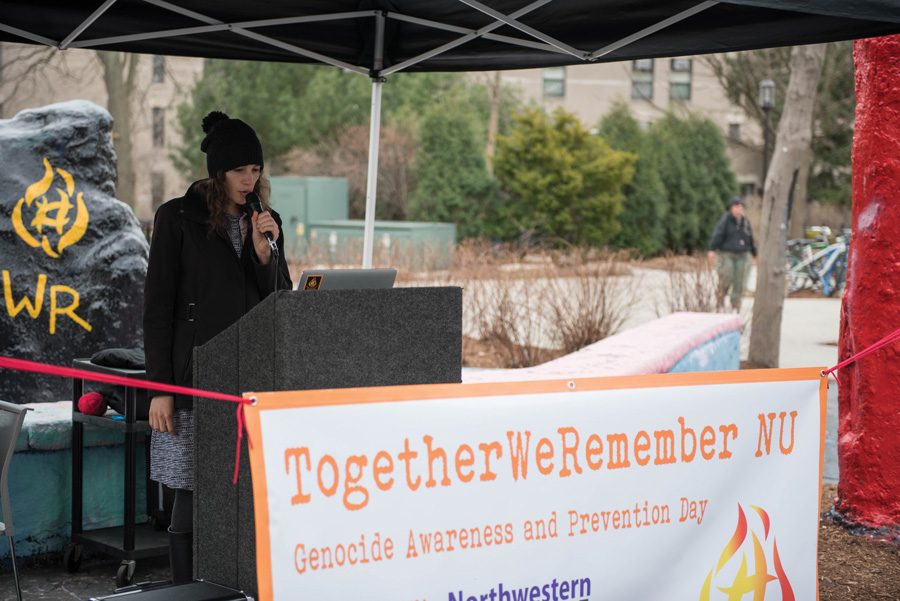Students commemorate genocide victims with 12-hour name reading
Katie Pach/Daily Senior Staffer
A volunteer reads out names of genocide victims in front of The Rock on Monday. The 12-hour name reading event, promoting genocide awareness and prevention, is the first ever at Northwestern.
April 3, 2017
Volunteers braved the rainy weather by The Rock – painted with a yellow flame representing genocide awareness – to participate in the University’s inaugural 12-hour genocide victim name reading Monday.
About 80 people signed up for shifts to read out the names as part of an international genocide awareness campaign, Together We Remember. The campaign was founded by a student at Duke University but has expanded to other universities and organizations for the first time this year, with about 30 other events taking place around the world for genocide awareness and prevention month in April.
Weinberg freshman Ben Chase said he heard about Together We Remember – originally a 24-hour name reading – and found four friends to help him organize a 12-hour event at Northwestern. The organizing team sought out Hillel to sponsor the event and help provide funding.
“I think every single person who’s walking by will be touched,” Chase said.
All of the Together We Remember events have access to a database of victim names from various genocides, Chase said. Volunteers signed up to read out the specific genocides, names and ages of victims for a period of 10 minutes.
Jonas Carlsson (McCormick ’17) said he heard about the name reading from a friend and decided to volunteer for a shift because he thought it would be an opportunity to humanize those who have died as a result of genocide.
“(Genocide) is something I overlook most of the time,” Carlsson said. “Hopefully this will foster some sort of conversation that recognizes the people that have died from genocide.”
As he was reading names, Carlsson said he noticed many students stopping and taking interest in the event. He said he hopes the awareness will eventually prompt genocide prevention initiatives.
Genocide is often overlooked or dismissed as being a distant problem, said Communication freshman Andrea Albanez, a member of the event’s organizing team.
“Genocide is something that has happened and is happening that we can’t forget,” Albanez said. “These people have the same civil rights, human rights, as any other person.”
While this is only the first year at NU, Albanez said students listening to the name reading as they walk past The Rock could create awareness, which could lead to real change in the long run.
Throughout the day, the event featured three speakers, including Holocaust survivor Matus Stolov. Chase said Stolov’s talk was particularly impactful because there are not many Holocaust survivors still alive today.
“Every time you have the opportunity you to hear someone like that speak about their experience is invaluable,” Chase said.
Both Chase and Albanez said it is important to highlight genocides that many people have not heard about.
“In school we’ve learned about the Holocaust, and we’ve learned about certain other genocides, but you don’t really hear about genocides that didn’t make national news, or that had no effect on our national agenda,” Albanez said.
Albanez said she wants people to recognize that the genocide victims are more than statistics and thinks the event does this by showing that the victims are not forgotten.
Chase said he hopes to expand in future years and increase genocide awareness on campus.
“It’s important to remember that these events happened as a result of hatred, of ostracism, and of othering people,” Chase said. “The more you learn the more prepared you are to stand up against that kind of hatred.”
Email: [email protected]
Twitter: @allymauch


